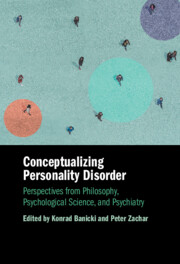 Conceptualizing Personality Disorder
Conceptualizing Personality Disorder Book contents
- Conceptualizing Personality Disorder
- Conceptualizing Personality Disorder
- Copyright page
- Contents
- Figures
- Tables
- Contributors
- Introduction
- Part I Historical Perspectives
- 1 How Personality Disorder Became an Independent Domain in Psychopathology
- 2 Ribot’s Novel Approach to Character Pathology
- 3 What Can the Dimensional Model of Personality Disorders Learn from Mischel’s Classical Challenge to the Trait Theory of Personality?
- Part II Contemporary Approaches to Traditional Conceptual Perspectives
- Part III Novel Conceptual Approaches to Personality Disorder
- Part IV Exploring Negative Consequences of Diagnosing Personality Disorder
- Part V Perspectives on Borderline and Narcissistic Personality
- Index
- References
2 - Ribot’s Novel Approach to Character Pathology
From Normal Indecisiveness to the Madness of Doubt
from Part I - Historical Perspectives
Published online by Cambridge University Press: 25 June 2025
- Conceptualizing Personality Disorder
- Conceptualizing Personality Disorder
- Copyright page
- Contents
- Figures
- Tables
- Contributors
- Introduction
- Part I Historical Perspectives
- 1 How Personality Disorder Became an Independent Domain in Psychopathology
- 2 Ribot’s Novel Approach to Character Pathology
- 3 What Can the Dimensional Model of Personality Disorders Learn from Mischel’s Classical Challenge to the Trait Theory of Personality?
- Part II Contemporary Approaches to Traditional Conceptual Perspectives
- Part III Novel Conceptual Approaches to Personality Disorder
- Part IV Exploring Negative Consequences of Diagnosing Personality Disorder
- Part V Perspectives on Borderline and Narcissistic Personality
- Index
- References
Summary
This chapter aims to shed light on Ribot’s analysis of the types of weakening of the will that lead more particularly to indecisiveness or irresolution, the extreme form of which he identifies as “madness of doubt” (“la folie du doute”). Our goal is to tackle the extent to which the physiological and “dissolutive” perspectives proposed by Ribot in Les Maladies de la Volonté (The Diseases of the Will, Ribot, 1883) and in Les Maladies de la Personnalité (The Diseases of Personality, 1885) differ from the more classical philosophical approaches to the weakness of will in terms of akrasia. We intend to explore how the definition of the self as a combination of multiple affective tendencies, which Ribot calls character, can help us understand better how irresolution (or indecisiveness) is more of a normal psychological state than a pathological one; the resolute, “strong character”, although enviable, is too rare to be considered a statistical norm. Nonetheless, irresolution can become a pathological “madness of doubt” paralyzing all agency in the affected individual. This chapter intends to show how Ribot’s contribution can be considered a precursor to transdiagnostic and dimensional perspectives, highlighting commonalities and shared mechanisms across different psychiatric disorders.
Keywords
Information
- Type
- Chapter
- Information
- Conceptualizing Personality DisorderPerspectives from Philosophy, Psychological Science, and Psychiatry, pp. 25 - 39Publisher: Cambridge University PressPrint publication year: 2025